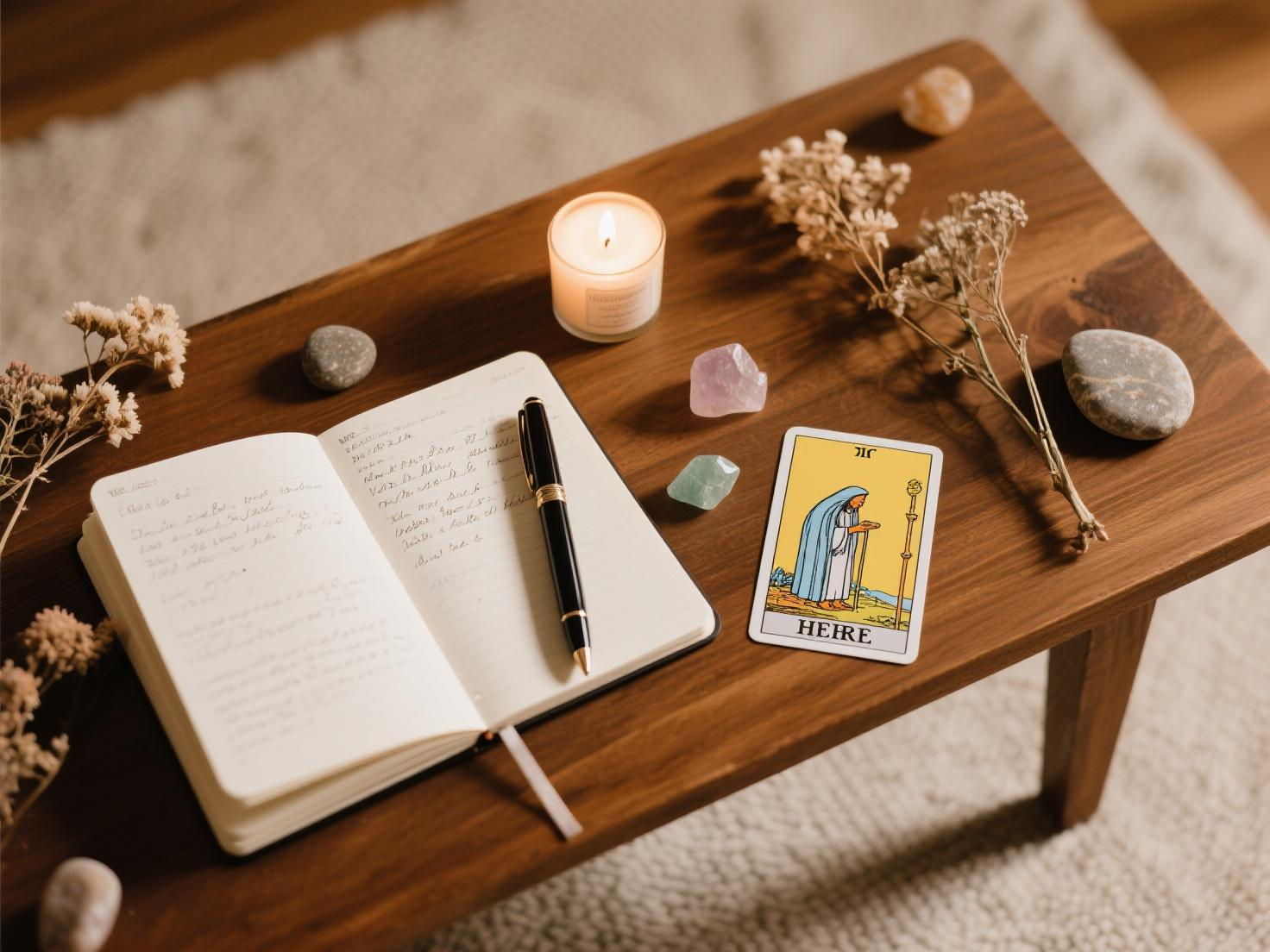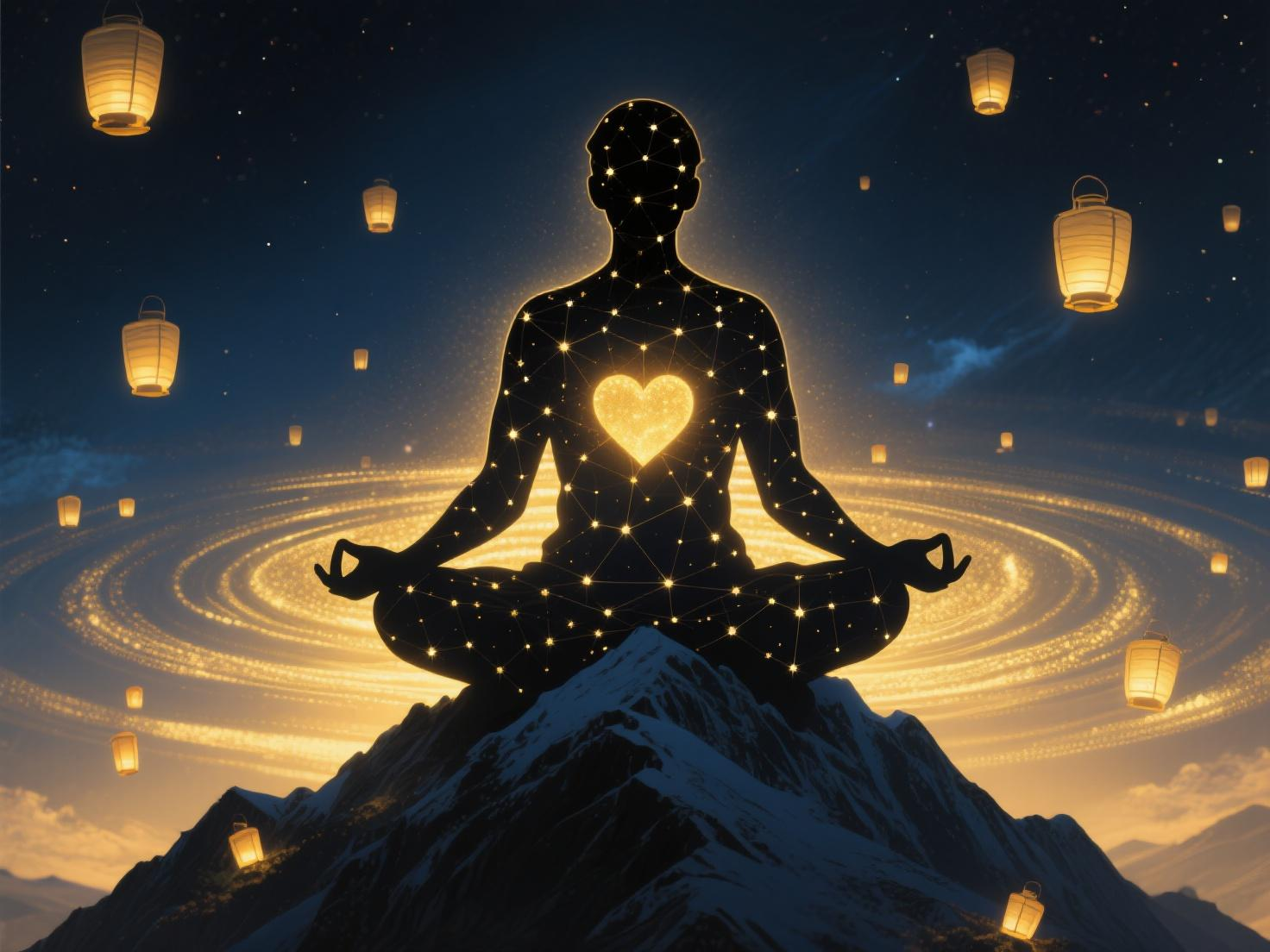The Hermit Card Deep Dive: Finding Inner Treasure in Solitude

When Everyone Else Seems to Have It Figured Out
It's 2 AM and you're wide awake, scrolling through endless feeds of people living their "best lives." Everyone seems so connected, so sure of their path, while you're here feeling like you're walking through life with a blindfold on. That familiar ache hits: "Am I the only one who feels this lost?"
If you've ever drawn The Hermit card during one of these moments, you might have felt disappointed. "Great, more isolation," you think. But here's what most people miss: The Hermit isn't about being alone – it's about being whole.
This isn't the card of the lonely outcast. It's the card of the wise seeker who understands something profound: the answers you're desperately searching for in the outside world have been inside you all along. Today, we'll explore how The Hermit can transform your relationship with solitude from something you endure into something you treasure.
The Hidden Psychology of The Hermit
The Hermit represents what psychologists call "necessary solitude" – the kind of alone time that's essential for psychological development. Unlike loneliness (which feels empty and painful), solitude is chosen and purposeful.
The Visual Story: An old figure stands on a mountain peak, holding a lantern that illuminates only a small circle around him. He carries a staff for support and wears simple robes. This isn't random imagery – every element tells part of your psychological journey.
The Mountain represents the hard climb of personal growth. You can't reach higher consciousness by staying in your comfort zone. The path upward is steep, and most people turn back.
The Lantern isn't lighting up the entire path ahead – just the next few steps. This is how real wisdom works: not grand revelations that solve everything, but small insights that guide you forward one step at a time.
The Staff symbolizes the wisdom you've accumulated through experience. Every challenge you've faced has become support for the journey ahead.
The Simple Robes show that external validation becomes less important as inner wisdom grows. The Hermit has shed the need to impress others.
Modern neuroscience backs this up: solitude activates the default mode network in your brain – the same neural pathways involved in self-reflection, moral reasoning, and understanding others. In other words, alone time literally rewires your brain for wisdom.

Your Hermit Toolkit: Transforming Solitude into Self-Discovery
The Lantern Light Practice (10 Minutes Daily)
Each evening, sit quietly and ask yourself: "What one insight did I gain today?" Don't hunt for earth-shattering revelations. The Hermit's lantern illuminates small truths.
Write down whatever comes up, even if it seems trivial. "I noticed I get defensive when I'm tired" is exactly the kind of insight The Hermit represents. These small awarenesses accumulate into profound self-knowledge over time.
Track patterns in your insights. What themes keep appearing? Where do you keep stumbling? The Hermit's wisdom comes from recognizing your personal patterns, not from adopting someone else's truth.
The Mountain Climb Meditation
When you're feeling lost or overwhelmed, visualize yourself as The Hermit. You're standing on your personal mountain – all the challenges you've overcome to get where you are today.
Look back down the path. See the obstacles you've navigated, the times you wanted to quit but didn't. Feel the strength in your legs from all that climbing. You're not lost – you're exactly where you need to be for this moment.
Now look at your lantern. What guidance is it offering for your next step? Not your entire future – just the next small move. Trust that this is enough.
The Wisdom Council Technique
The Hermit represents your inner wise guide, but he's not the only voice in your psyche. Create a dialogue between different aspects of yourself:
- The Hermit (Inner Wisdom): What does your deepest knowing say?
- The Fool (Inner Child): What would be fun or adventurous?
- The Magician (Inner Creator): What possibilities exist here?
- The High Priestess (Inner Intuition): What feels right, even if you can't explain why?
Write out conversations between these aspects when facing decisions. You'll be surprised how different perspectives emerge when you stop trying to think with just one voice.
The Solitude Sabbath
Once a week, take a "hermit day" – even if it's just a few hours. No social media, no constant input, no agenda beyond being with yourself.
Start small: 30 minutes in nature without your phone, or an hour of journaling without interruption. Notice what arises when the external noise stops. Boredom? Anxiety? Relief? All of these reactions contain information about your relationship with yourself.
The goal isn't to become antisocial – it's to develop such a strong connection with your inner world that you choose social interaction from fullness rather than emptiness.
Case Study: Marcus's Journey from Networker to Wise Guide
Marcus, a 35-year-old sales executive, lived for connection. His calendar was packed with networking events, his phone constantly buzzing with messages, his weekends filled with social commitments. But despite being surrounded by people, he felt profoundly empty.
When The Hermit appeared repeatedly in his readings, Marcus resisted. "I don't need more alone time – I need more meaningful connections!" But every attempt to fill the void through external relationships left him feeling more drained.
Finally, a health scare forced him into isolation for two weeks. Initially panicky, Marcus gradually began enjoying the quiet. He started noticing things: how coffee tasted in the morning when he wasn't rushing, how his thoughts moved when not constantly interrupted, how his body felt when not performing for others.
The breakthrough came when Marcus realized he'd been using constant social interaction to avoid facing his own inner critic – the voice that told him he wasn't interesting enough, successful enough, worthy enough on his own. The Hermit period forced him to confront and eventually befriend this critical voice.
Six months later, Marcus had transformed his approach to relationships. Instead of networking frantically, he formed deeper connections with fewer people. Instead of talking to fill silence, he learned to listen. His sales numbers actually improved because clients felt genuinely heard rather than sold to.
"I thought The Hermit meant becoming antisocial," Marcus reflects. "But it taught me how to be social from a place of wholeness rather than need."

The Gifts of Hermit Energy: What Changes When You Embrace Solitude
Authentic Decision-Making: When you stop crowdsourcing every choice, you develop trust in your own judgment. The constant anxiety of "What should I do?" transforms into the confidence of "I know what feels right for me."
Deeper Relationships: Paradoxically, people who are comfortable alone form stronger connections with others. You stop clinging to relationships out of fear and start choosing them out of genuine affinity.
Creative Breakthrough: Your best ideas need space to emerge. The Hermit's solitude creates the mental space where innovation happens.
Emotional Resilience: When you're not dependent on external validation for your sense of worth, life's ups and downs affect you less dramatically. You become your own source of stability.
Spiritual Connection: Whether you call it God, Universe, Higher Self, or simply deep knowing, the sacred becomes accessible in quiet moments rather than crowded ones.
The Hermit doesn't promise that solitude will always feel comfortable – growth rarely does. But it promises that the discomfort is meaningful, leading somewhere valuable rather than nowhere at all.
Your Hermit Path Starts Now
This Week: Try the Lantern Light Practice. Just 10 minutes each evening, asking what small insight today offered you.
This Month: Take your first Solitude Sabbath. Start with just one hour of intentional alone time without distractions.
Create Your Space: Designate a corner of your home as your "hermit spot" – somewhere you can sit quietly without interruption.
Release the Guilt: Our culture glorifies busyness and connection. Give yourself permission to value solitude without justifying it to others.
Trust the Process: The Hermit's lantern doesn't reveal everything at once. Trust that each small insight is leading you toward greater understanding.
Remember: The Hermit isn't running away from the world – he's preparing to return to it with wisdom. Your solitude isn't selfish; it's how you develop the inner resources to truly serve others.